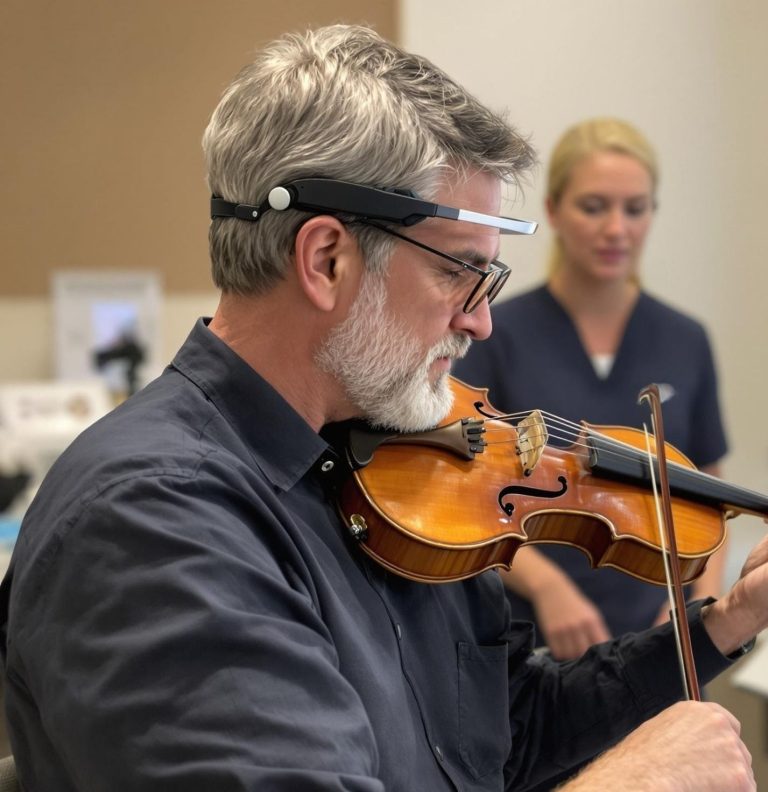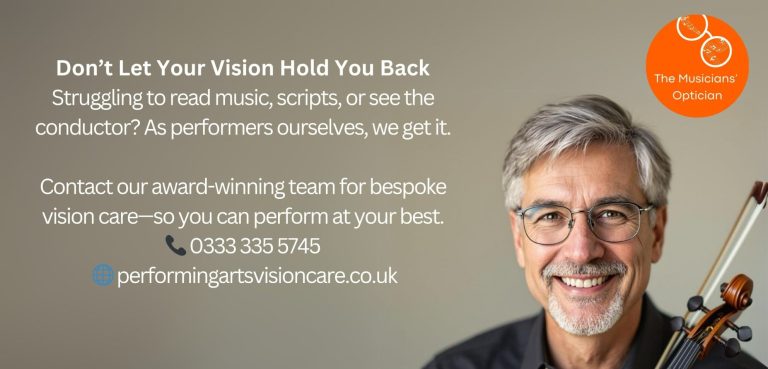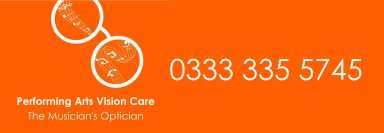
After his diabetes diagnosis, Wayne made healthy changes—but twelve years on, he still developed diabetic retinopathy.

"Wayne contacted Performing Arts Vision Care after hearing about our work with musicians.”

We assessed Wayne using saccadic eye tracking, visual field, and gaze analysis to understand how diabetic retinopathy affected his vision.

VR visual gaze analysis tracks ocular behaviour in virtual environments to show where users look and how they interact.

We can’t see exactly what Wayne sees—diabetic retinopathy affects everyone differently—but this image reflects how Wayne describes his vision when sight reading.

We discussed Wayne’s sight reading and performance vision challenges—such as glare, dry eyes, and increased performance pressure—and created corrective lenses customised for him.

Wayne ordered two pairs of prescription glasses, choosing lightweight, discreet, and comfortable frames.

A few weeks later, we visited Wayne at his workplace to deliver his new glasses, and he was thrilled with the results.

Don't let your vision hold you back
14/06/2025
Case Study: “Wayne”—Navigating Diabetic Retinopathy as a Professional Musician and Educator
Names and identifying details have been changed to protect privacy
Wayne” is a professional musician and music teacher in his early 60s. With a career spanning decades, Wayne’s passion for music has always been matched by his dedication to his students and his craft. Twelve years ago, Wayne was diagnosed with type 2 diabetes—a condition he approached with determination and discipline. He made significant lifestyle changes, including quitting smoking, losing weight, and increasing his physical activity.
The Challenge
Despite his best efforts, Wayne developed diabetic retinopathy—a complication that can affect anyone living with diabetes, regardless of how well they manage their condition. For Wayne, this diagnosis was more than a health concern; it threatened his ability to read music, conduct rehearsals, and teach effectively. The fluctuating vision, difficulty focusing on sheet music under variable lighting, and the anxiety of potential vision loss created a daily struggle.
As a working performer and educator, Wayne faced an additional challenge: the stigma surrounding disability in the performing arts. Like many of his peers, he worried that acknowledging his difficulties could jeopardize his position and reputation.
The Need for Confidentiality
Protecting the identity of clients like Wayne is not just a courtesy—it’s an essential part of our work at Performing Arts Vision Care. Research by Help Musicians and The Musicians’ Union has shown that many professional and session musicians with disabilities, including vision impairment, feel compelled to hide their conditions due to fear of discrimination or losing work opportunities. According to a December 2024 Sky News article the fear of discrimination is a significant barrier to inclusivity in the music industry. Additional research published by UK Music and the Musicians’ Union highlights that more than half of disabled music industry workers do not disclose their conditions. Vision deterioration, in particular, remains a real taboo among performers, with many fearing that disclosure could lead to exclusion from opportunities or even job loss.
For Wayne, and many others, maintaining confidentiality is not just about privacy—it’s about safeguarding their livelihoods and dignity in an industry that still has significant progress to make on inclusivity.
Seeking Specialist Support
Wayne reached out to Performing Arts Vision Care after hearing about our work with other musicians. During his initial consultation, and during a refinement visit following a referral for another unrelated issue, we conducted a comprehensive assessment, including saccadic eye tracking, an enhanced visual field analysis and a visual gaze dynamic assessment, to understand the specific impact of diabetic retinopathy on his visual performance.
Our Solution
We developed a bespoke lens solution tailored to Wayne’s needs:
Custom filters and prisms to address binocular imbalance and improve focus between near (sheet music) and distance (conductor or students).
Specialized lens coatings to reduce glare from stage and classroom lighting.
Precision filters are designed to reduce or eliminate specific light wavelengths that can cause glare and eye strain—common issues for people with diabetic retinopathy. By targeting these problematic wavelengths, Wayne’s lenses provided a more comfortable and stable visual experience, even under challenging lighting conditions.
Precision tinting to ease visual stress and support comfortable reading, even during long rehearsals.
Wayne’s initial assessment took 90 minutes, and his tailored lenses were delivered within three weeks. At the fitting, we made minor adjustments to the two pairs of glasses he ordered, to ensure optimal comfort and performance.
The Impact
Wayne reported an immediate improvement in his ability to read music clearly and shift focus quickly between different tasks. The custom solution reduced his visual fatigue, allowing him to maintain his teaching schedule and performance commitments without fear or frustration. Most importantly, Wayne regained confidence in his professional abilities—without needing to disclose his condition to colleagues or employers.
Wayne has been delighted with the results, telling us:
“My new glasses are excellent—the lenses feel really restful, and I’m hopeful the performance pressure I was feeling will now be a thing of the past. I can’t thank Sheryl, Abi, and everyone at Performing Arts Vision Care enough. I’ll be highly recommending you to my colleagues and friends.”
Reflections
Wayne’s story is a powerful reminder that even with the best self-care, diabetic retinopathy can affect anyone with diabetes. For performers and educators, the right vision care can be life-changing—not just for their careers, but for their sense of self and independence.
Wayne’s experience highlights the very real challenges faced by professional musicians and educators living with diabetes and vision impairment—challenges that are compounded by a culture of silence and stigma in the performing arts. At Performing Arts Vision Care, we understand the importance of both specialist support and absolute confidentiality. Our mission is to empower performers to continue doing what they love, safely and confidently, no matter the visual obstacles they face.
If you’re a performer or educator experiencing vision difficulties, or if you’re concerned about how a visual condition might impact your career, know that you’re not alone. Specialist, confidential support is available and it can make all the difference.
Contact us to arrange a confidential consultation, or to learn more about our bespoke vision solutions for performers.
Your vision matters—to your career, your well-being, and your art. Let us help you protect it.
©Copyright. All rights reserved.
We need your consent to load the translations
We use a third-party service to translate the website content that may collect data about your activity. Please review the details in the privacy policy and accept the service to view the translations.
